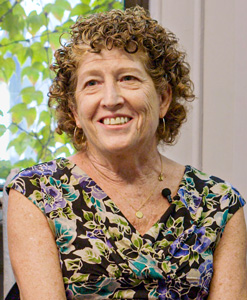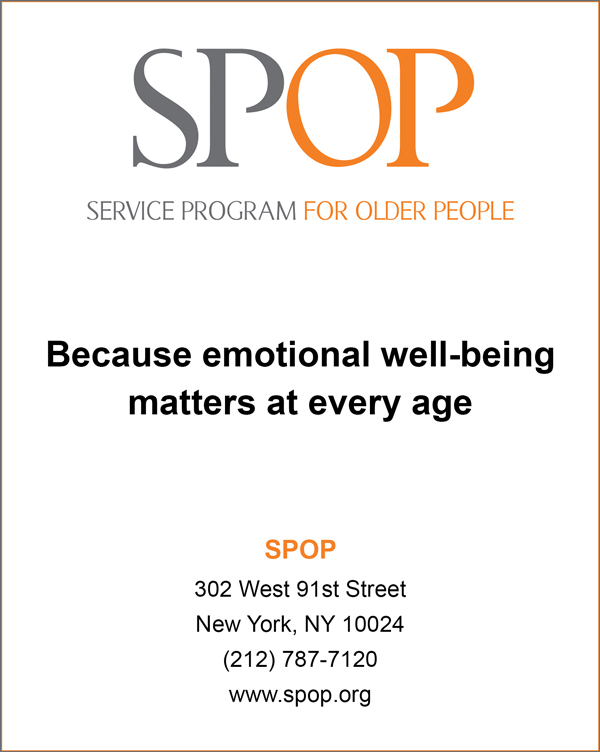As we move into Year Three of the Covid-19 pandemic, older adults remain at high risk. Those over age 65 now account for 90% of COVID deaths – and many of those becoming ill are fully vaccinated and boosted. While many Americans feel confident to resume social activities and travel, our older friends, neighbors, and family members continue to experience isolation, anxiety, and despair associated with the pandemic.

Nancy Harvey, LMSW
At SPOP/Service Program for Older People, we are acutely aware of the pandemic’s continued impact on mental health and well-being of older adults in our region. As the only agency in New York City exclusively focused on community-based behavioral healthcare for adults age 55 and older, SPOP provides a continuum of services including individual and group therapy, psychiatry, group-based rehabilitation support, bereavement support, linkages to other service providers, and training in the field. We serve over 2,000 adults each year and provide services at 23 locations in Manhattan, Brooklyn, and the Bronx, via telehealth, in the home for those who are disabled.
At this time last year, we were able to reflect on how our client population had managed during the pandemic – they had embraced telehealth and online learning or socialization opportunities, and many had demonstrated remarkable resilience as they adapted to a new way of living. Our clients were creating artwork, chatting with grandchildren on the computer, attending religious services online, and working to manage their fears and adjust to a new reality. Most important, we felt tremendous optimism that the high rates of vaccine compliance among older adults in New York City would provide a secure level of protection.
We now know that, while vaccinations definitely help, their effectiveness in an older population is reduced because the aging immune system is less robust. Older New Yorkers feel this first-hand. Our clients are aware of high rates of COVID transmission among their cohorts. Many have experienced the loss of a partner, spouse, friend, or loved one due to COVID, and many are fearful to venture into social settings. Referrals for behavioral healthcare at our Clinic remain abnormally high and client symptoms are severe.
SPOP is bracing for a challenging winter, and isolation among older adults is one of our leading concerns. Three years ago, isolation was a painful but adaptive way of living that everyone had to embrace. For many older adults, physical isolation was compounded by the deaths of friends and family members, leaving them emotionally isolated and bereft, without community support for mourning. Many of our clients continue to experience intense seclusion, unresolved grief, and despair – especially as they face a third winter alone.
Within the clinical setting, the challenges of isolation and loneliness are often manifested in severe depression, distressing symptoms of anxiety, insomnia, substance misuse, hoarding, increased suicide ideation, eating disorders, or unhealthy media consumption. At SPOP we see a worrisome increase in this trend. Some older adults try to self-manage anxiety-related insomnia by consuming alcohol or cannabis or by binge-watching television. Hoarding is serious problem for many in our client population, which is generally compounded by fear of eviction. Clients who are managing chronic pain or illness are often reluctant to enter a hospital – or they are frustrated by challenges in scheduling medical appointments. And the most marginalized among us – people of color, LGBTQ people, and those experiencing homelessness – are at risk for discrimination, hate crimes, and diminished access to healthcare.
In many ways Year Three of the pandemic is more challenging than the first two years. Every community-based behavioral healthcare I know is struggling to recruit and retain staff, address employee burnout and compassion fatigue, and manage a growing wait list for treatment. Among older adults, fatigue and hopelessness have replaced the resilience that we saw in 2020. There is general acknowledgement that we are facing a mental health epidemic.
At SPOP we have taken concrete steps to meet these challenges. We expanded our group therapy offerings so that clients have an opportunity to experience peer support and social engagement as part of their treatment. We have forged new partnerships with community-based organizations and older adult centers that serve marginalized populations, including LGBTQ adults, people of color, and those most severely impacted by COVID-19. We created trainings in self-care to address trauma and compassion fatigue, which we have presented to our own staff and to those working in aging services or behavioral healthcare. We opened new clinic satellite sites in high-need neighborhoods of the city. We provided emergency food assistance for those who needed help purchasing groceries. And we have worked with each client to determine the safest and most beneficial balance of telehealth and in-person sessions.
Even with these stark truths, we remain focused on the value of therapy as a foundation of support and healing, as illustrated by this client’s story:
Elizabeth is a 60-year-old Latinx transgender woman. She has a long history of trauma and discrimination, which she feels worsened dramatically during the pandemic. She is routinely mocked, sexualized and harassed in the street, and she often feels afraid to leave her home. She is currently receiving treatment at a SPOP clinic satellite site co-located at an LGBTQ-supportive older adult center near her home. She appreciates the easy access to care and has recently started to take advantage of other resources at the center. She is making progress toward treatment goals and is building a supportive social network.
The past three years have also been a time to reflect on our work and our role in keeping older adults healthy and independent. We hear from many clients that the relationship with their therapist has been a lifeline during the pandemic. Our staff also report that this has been an especially rewarding experience, as they learn from their clients and are reminded why they chose this profession. We expect a challenging winter ahead, but we feel confident that we have learned how to adapt to the changing environment to meet the needs of our clients. This work has never been needed more urgently.
Nancy Harvey, LMSW, is Chief Executive Officer at Service Program for Older People (SPOP). Launched in 1972 and independently incorporated in 1979, SPOP is one of the largest and longest-standing agencies entirely focused on community-based behavioral healthcare for adults age 55 and older. Learn more at www.spop.org.





